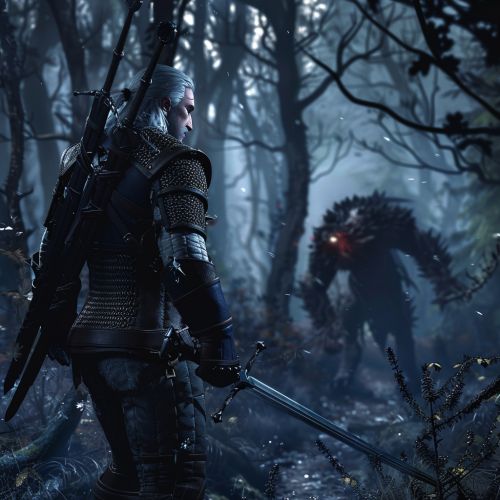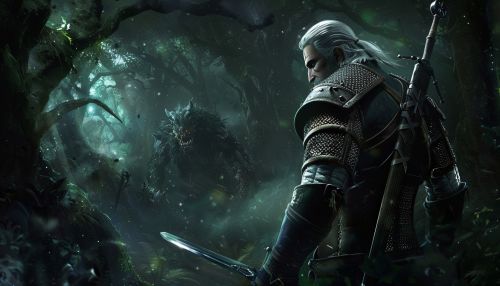The Witcher
Introduction
"The Witcher" is a series of fantasy novels and short stories written by Polish author Andrzej Sapkowski. The series revolves around the titular character, Geralt of Rivia, who is a "witcher" – a genetically enhanced human with special powers trained to hunt and kill monsters. The Witcher series has gained international acclaim, spawning a successful video game franchise, a television series, and various other media adaptations.
Origins and Development
The Witcher series began with a short story titled "Wiedźmin" (The Witcher), which was published in 1986 in the Polish fantasy and science fiction magazine Fantastyka. Sapkowski's unique blend of Slavic mythology, folklore, and modern fantasy elements quickly garnered a dedicated readership. The initial short story was followed by several more, eventually leading to the publication of two collections: "The Last Wish" and "Sword of Destiny". These collections set the stage for the main saga, which consists of five novels: "Blood of Elves", "Time of Contempt", "Baptism of Fire", "The Tower of the Swallow", and "The Lady of the Lake".
Plot Overview
The Witcher series is set in a fictional, medieval-inspired world known simply as "The Continent". The narrative follows Geralt of Rivia, a solitary monster hunter who struggles to find his place in a world where people often prove more wicked than the beasts he hunts. The series explores themes of destiny, morality, and the nature of good and evil.
The Last Wish and Sword of Destiny
These collections of short stories serve as prequels to the main saga. They introduce Geralt and other key characters, such as Yennefer of Vengerberg, a powerful sorceress, and Ciri, a young girl with a mysterious destiny intertwined with Geralt's own.
The Main Saga
The main saga begins with "Blood of Elves", where the political landscape of The Continent is in turmoil. Various factions vie for power, and war looms on the horizon. Geralt becomes the guardian of Ciri, who possesses extraordinary abilities that make her a target for many. As the series progresses, Geralt, Ciri, and Yennefer navigate a complex web of alliances, betrayals, and conflicts.
Characters
The Witcher series features a rich cast of characters, each with their own intricate backstories and motivations.
Geralt of Rivia
Geralt is the protagonist of the series. As a witcher, he possesses enhanced physical abilities, longevity, and the ability to use simple magic. He is known for his white hair, a result of the mutations he underwent during his training. Geralt is often portrayed as a stoic and morally complex character, struggling with his own identity and the expectations placed upon him.
Ciri
Cirilla Fiona Elen Riannon, commonly known as Ciri, is a central figure in the series. She is the princess of Cintra and has Elder Blood, which grants her extraordinary powers. Ciri's destiny is closely linked to Geralt's, and she undergoes significant character development throughout the series.
Yennefer of Vengerberg
Yennefer is a powerful sorceress and Geralt's love interest. She is characterized by her intelligence, ambition, and complex personality. Yennefer's relationship with Geralt is tumultuous, marked by deep affection and frequent conflict.
Other Notable Characters
The series features numerous other characters, including Dandelion (Jaskier), a bard and Geralt's close friend; Triss Merigold, a sorceress and ally; and various kings, queens, and political figures who shape the world of The Continent.
Themes
The Witcher series delves into several profound themes, often challenging traditional fantasy tropes.
Destiny and Free Will
One of the central themes is the tension between destiny and free will. Characters frequently grapple with the idea of whether their paths are predetermined or shaped by their choices.
Morality and Ethics
The series presents a morally grey world where the distinction between good and evil is often blurred. Geralt's profession as a monster hunter forces him to confront ethical dilemmas, questioning what it means to be truly human.
Power and Corruption
Political intrigue and the corrupting influence of power are recurrent themes. The struggle for control over The Continent leads to alliances, betrayals, and conflicts that drive the narrative forward.
Adaptations
The Witcher series has been adapted into various forms of media, each bringing its own interpretation to Sapkowski's world.
Video Games
The most notable adaptation is the video game series developed by CD Projekt Red. The games, particularly "The Witcher 3: Wild Hunt", have received critical acclaim for their storytelling, world-building, and complex characters. The games have introduced the series to a global audience, significantly boosting its popularity.
Television Series
In 2019, Netflix released a television adaptation titled "The Witcher", starring Henry Cavill as Geralt. The series has been well-received, praised for its faithful adaptation of the source material and its high production values.


Other Media
The Witcher has also been adapted into comic books, tabletop role-playing games, and a Polish film and television series from the early 2000s. Each adaptation offers a unique perspective on the rich lore of The Continent.
Cultural Impact
The Witcher series has had a significant cultural impact, particularly in the realm of fantasy literature and media.
Literary Influence
Sapkowski's work has been credited with reinvigorating the fantasy genre, particularly in Eastern Europe. His blending of folklore, mythology, and modern themes has inspired a new generation of fantasy writers.
Popularity and Fandom
The series has garnered a dedicated fanbase, with conventions, fan fiction, and online communities celebrating the world of The Witcher. The success of the video games and television series has further cemented its place in popular culture.
